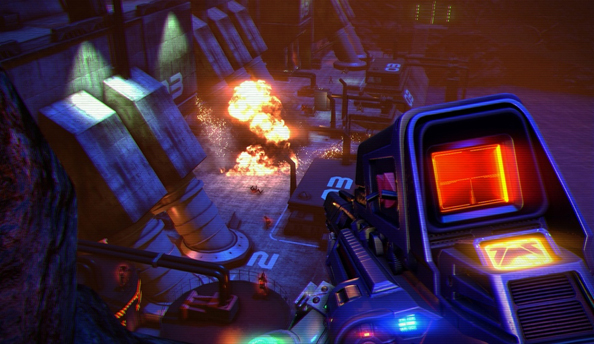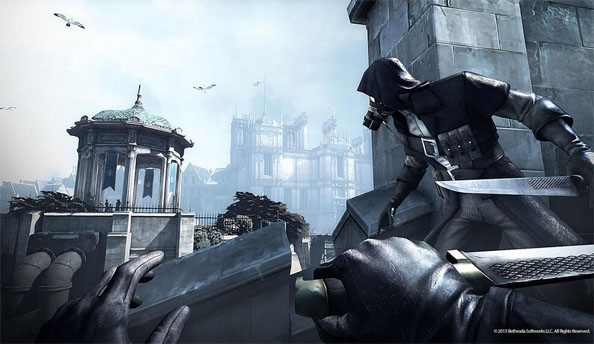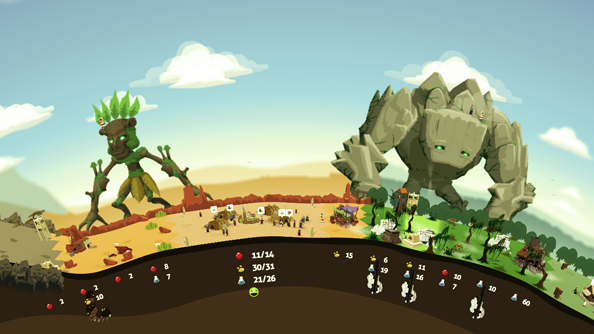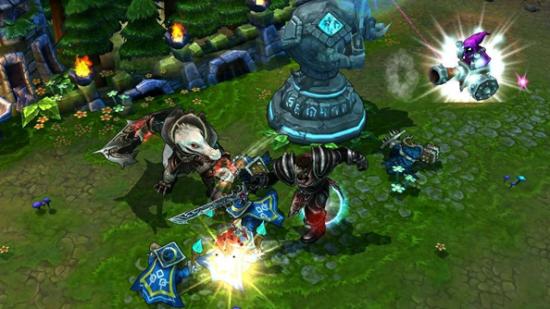This week’s playlist has death, intrigue, and cuddly little villagers. Rob’s returned to League of Legends where he finds the reward for training hard and honing your skills. Jeremy taken to the streets and rooftops of Dunwall to enact his voyeuristic desires. Matt’s discovering the problems of injecting the 80s into a tactical island shooter. And Julian plays the puppet master in indie god game Reus. He also has a problem with his stoats.
Rob Zacny: League of Legends
I’m on this kick where I’m trying to play a little StarCraft and a little League of Legends every day. If I think too much about it I start to feel like a fool, because it seems like I’m placing a ton of importance on games that I will never have the time to truly invest myself in. But they are also games that I always return to, and which are always relevant to my work, so I’ve tried to carve a little space into my mornings and evenings to practice fundamentals.
My latest return to League has been humbling. My first match in months, I found that my tactical sense had not deserted me, but my last-hitting was a shambles. I was getting out-farmed in bottom to an insane degree, and getting poked to death. At 10 minutes I had less than 30 CS. When our team put up a surrender vote, I had to admit I’d screwed up our chances and voted to surrender.
This one guy, though, refused to let us surrender and simply said, “Don’t worry, guys, we got this.” Two of our teammates bailed immediately and he said, “Lol, we’ll report them. But you guys are trying really hard! I believe in you!”
Then he went and won the game for us, posting up a 26/5/8 KDA.
There’s something inspiring about other people’s mastery, especially when they’re actually likable about it, as opposed to arrogant or snide. Watching one player single-handedly demolish the other team, offering tips and encouragement during his brief visits to the shop, was like a advertisement for sticking with League: “Someday, with practice, determination, and a good attitude, you too could single-handedly carry a short-handed team to victory.”
Matt Purslow: Far Cry 3 Blood Dragon

The cybernetic implant renders the aftermath of Vietnam War 2 in a dull red, a set of sensors pulse in the lower left of my vision as they scan for hostiles. I stride with purpose towards the neon-lit stronghold, tight leather creaking on my torso. I load thirty shells into a quad-barreled shotgun and snap the lever into place. It’s time to kick ass.
All four barrels flare as the first load of buckshot rips apart the man at the gate, his blue synthetic fluids splashing the floor. His back-up squad receive the same treatment. I quickly flip my middle finger at their corpses. I effortlessly mutter a few words. They’ll be immortalised in an action film one day, glorifying my actions. As more cyborg troopers turn up, I pull out my very special friend. Lasers erupt from her rotating muzzle, lighting up the area and mowing down the opposition two at a time. A wire snaps. A fuse sparks. I’m on the floor, the vision in my cyber eye slowly fading. Those lessons from Schwarzenegger don’t seem to be paying off.
As much as Blood Dragon wants to be a massive 80’s action bonanza, it can’t. Far Cry 3 was always at its best when you tactically planned your advance and used all manner of sneaky tricks to bring down enemy garrisons. Blood Dragon retains the core of its parent, and as such running in all guns blazing – no matter how insanely rad it may be – is doomed to fail. Trust me on this one, the neon bow and the extendo-barrel sniper rifle are your best friends. There’s still been a good haul of classic action-hero moments (racing a jeep through an exploding base is a fantasy made real), but when it comes to the bulk of Blood Dragon, I’ve found soft footsteps and a swift blade far more effective than screaming one-liners over a hurricane of bullets. It’s not what I wanted from Blood Dragon, but I can’t deny that Far Cry’s combat still feels fantastic, even when bathed in neon.
Jeremy Peel: The Knife of Dunwall (Must remember to introduce myself this way at dinner parties. Just as soon as I get invited to one.)

The thing I’ve most recently come to love about Dishonored’s levels isn’t that they’re possibility spaces – though my goodness, they are. It’s that they’re possible spaces.
Scientists have posited that a game’s interactive depth is directly proportional to the attention lavished upon its toilets; the twist of its taps, the flush of its bowls. Well guess what: not only do I know where the employees of Bundry Rothwild’s slaughterhouse go to relieve themselves, I also know where they wash, where they eat, what they eat. I know where they are tortured as dissidents.
I know the vantage point from which Bundry watches his workers as they slice chunks from the moaning whales. I know where the great beasts are hoisted in, and where their blood is drained out. I’ve seen the empty crates waiting to host the blubber that powers the rest of the city. I could tell you precisely when the next living shipments are due in over the course of the next month. I’ve seen the logs.
All of that knowledge is, for the most part, thanks to the school of dense level design that Arkane subscribe to. Like the metropolises it was built to mimic, Dunwall’s living spaces are packed one atop the other, and every blank corner is ripe for a secreted rune or some small tale told by two corpses and a note.
But as Tim intimated a month ago, it’s also because Dishonored is about its places. If it were a shooter, those toilet blocks would serve only as impromptu cover, or to conceal an alien going about his business, ho ho. But success in Dishonored is achieved by making yourself intimately familiar with the limits of your surroundings. That’s the only way you’ll ever manage to hide yourself effectively, or navigate from one side to the other.
The result is that the layout of Rothwild’s domain is burned into my brain, like charcoal into wood – crudely, but irrecoverably. I couldn’t draw a map of the street on which I live, but if you ever need to know the ins and outs of a fictional slaughterhouse? I’m your man.
Julian Benson: Reus

I can’t transform my stoats into beavers because my stone god doesn’t have a forest ambassador because I failed to build a fishing hut in my village because I didn’t have enough wealth to please the villagers because I didn’t place enough mineral veins within their city limits because I didn’t have enough space because the village is too close to the ocean which was the first thing I placed in the game. Yup, your choices in Reus have consequences.
From the very first thing you place in the game you need to be thinking about what will be the best framework for your people to build their villages on. This isn’t a new challenge for god games, when I think back to Theme Hospital, I think of the time that I made my doctors’ lounge one square too large and didn’t have enough space for an operating theatre. It’s just that it’s a frustration that plagues the early plays of any god game. I will learn what the ideal placement of oceans, mountains, and forests is but this first world is one for scrap. It’s a trial till I learn how to make the perfect world.
Where Reus does start to break away from the tropes of god gaming is in its puppeteering playstyle. As you can’t place villages in Reus, they form when a nomad tribe finds a suitable plot of land, it’s all about encouraging the nomads to settle where you want them. Placing an apple true at the border of a strip of woodland, right on the fringes of the uninhabitable wasteland beyond, prompts the nomads to set up shop in the centre of the forest. This in turn means their town limits embrace fertile land, not the dry wastes. It’s a hands-off style of world design and it’s taking practice to get it right.
I’ll be writing more about Reus later this week.
